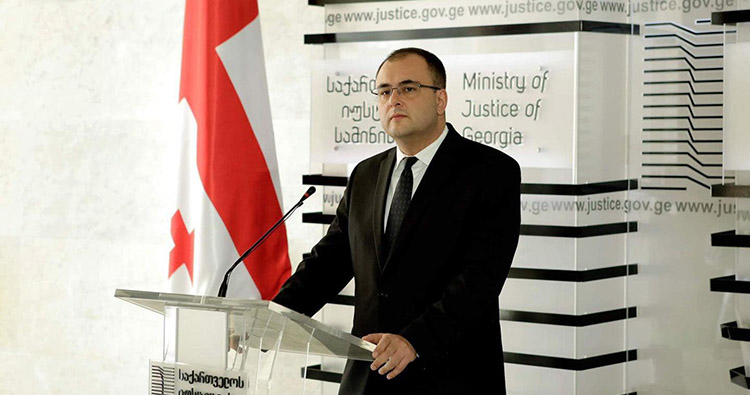Justice Minister: European Committee report “welcomed cooperation” with Tbilisi clinic treating imprisoned fmr President Saakashvili

Bregadze added the official use of cameras, after their disclosure to inmates, was in “full compliance” with the country’s legislation and a “completely legal measure”, and claimed the Government “would be blamed in case of any accidents” not recorded by the equipment. He mentioned video footage of the imprisoned former President falling out of his bed, released in February and broadcast on a television channel, as an example. Photo: Ministry of Justice
Rati Bregadze, the Georgian Justice Minister, on Monday said the latest report by the European Committee for the Prevention of Torture and Inhuman or Degrading Treatment or Punishment had reflected the cooperation offered to the body by the Tbilisi clinic where the imprisoned former President Mikheil Saakashvili is undergoing treatment.
Bregadze was commenting on the report that was published last week, following the visit of the Committee’s delegation to the country on March 25-27 last year to visit convicts, including Saakashvili, and study their conditions at the civilian clinic where the latter was moved from a detention facility in 2022.
The Minister said the delegation expressed their satisfaction to the management and staff of the civilian clinic in Tbilisi, and for their “open cooperation”, with the officials “positively assessing” the opportunity to contact convicted individuals and have a personal conversation with them “without hindrance”.
Bregadze also noted the ruling of the European Court of Human Rights which in May rejected Saakashvili’s request to be transferred from the clinic to Poland’s capital Warsaw for treatment, and noted the decision was a “brief response” to “all questions” on alleged inhumane treatment and oppressive environment for the former official, claimed by his representatives. The Minister said the ruling had been made “based on the information and evidence provided”.
He also explained the reason for presence of monitoring cameras facing Saakashvili’s bed in his clinic room - an issue raised by the report - by saying the decision served “safety of the convict” on the backdrop of claims by Saakashvili’s family of his “poisoning” - an allegation he said had turned out to be “complete speculation”.
Bregadze added the official use of cameras, after their disclosure to inmates, was in “full compliance” with the country’s legislation and a “completely legal measure”, and claimed the Government “would be blamed in case of any accidents” not recorded by the equipment. He mentioned video footage of the imprisoned former President falling out of his bed, released in February and broadcast on a television channel, as an example.
The Justice Minister also noted an incident where a medical professional from a visiting group of Polish doctors had attempted to smuggle a sample taken from the former official through their shoe, adding the footage of the incident had been released by the Penitentiary Service to demonstrate the patient’s safety was protected.
He also said representatives of Saakashvili had “never had problems with the video cameras”, and added human rights defenders had also requested and used the footage as they had been granted access to “complete records” of his stay at the clinic.
He claimed “all citizens” were “well-aware of the campaign” allegedly involving Saakashvili and a “small group of his supporters against Georgia”, further justifying use of video cameras.
Bregadze said his office would “never allow anyone to discredit the state and mislead its citizens” around the matters of Saakashvili’s detention and treatment conditions, adding the imprisoned former President refused to eat food offered by the clinic and the Special Penitentiary Service, with products brought to the inmate by family members daily.
The official added said it was “Saakashvili’s wish to be alone in the cell and in the ward”, and noted he had hosted “3,000 visitors in less than two and a half years”, adding the Service would “find an individual who wishes to be [placed] with him” if the former President expressed his wish to be accommodated with another prisoner.
 Tweet
Tweet  Share
Share